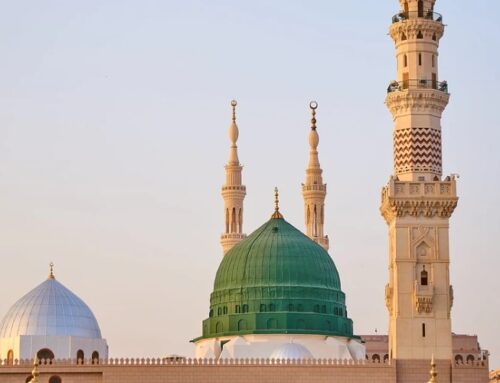The Living Miracle: In the Shade of Salman al-Farsi’s Garden
In the luminous city of Medina, a place where every grain of sand seems to hold a memory of revelation, there exists a garden unlike any other. It is not a grand, manicured park or a sprawling botanical wonder. To the unassuming eye, it is a tranquil orchard of date palms, their fronds whispering in the desert breeze. Yet, this small plot of land is a living testament to one of the most remarkable stories of faith, freedom, and divine intervention in the history of Islam. This is the Garden of Salman al-Farsi, an orchard planted by a prophet’s hands to purchase a man’s freedom, where the soil itself is steeped in the ink of sacred history.
To understand the garden, one must first understand the man. His story did not begin in the sands of Arabia but far away, in the verdant hills of Persia, in a village near Isfahan. Born Rozbeh, he was the son of a Zoroastrian priest, destined to a life of privilege and religious authority. But within his heart stirred a profound and restless quest for a singular, universal truth. This inner fire led him away from the faith of his ancestors, first to the hidden communities of Nestorian Christians in Syria, where he served one pious monk after another, absorbing their wisdom and awaiting a sign.
Each mentor, on his deathbed, would point him further on his journey, until his final teacher gave him the most definitive prophecy of all: a final prophet was to appear, not in Syria or Persia, but in “the land of two lava fields, between which are palm trees.” He would bear three unmistakable signs: he would not eat from charity (sadaqah), he would accept a gift (hadiyya), and between his shoulders would be the Seal of Prophethood. With this knowledge as his compass, Salman joined a caravan heading for Arabia, his heart alight with hope. But his journey to truth would first take a devastating detour into bondage. The caravan was betrayed, and Salman, the Persian nobleman and spiritual seeker, was sold into slavery, passed from one master to another until he found himself in the bustling oasis city of Yathrib—the very land of palms and lava fields from his teacher’s prophecy.
An Oasis on the Cusp of Revelation
Yathrib, the city that would become Medina, was a complex tapestry of life. Its wealth flowed from the majestic date palms that punctuated its landscape, their cultivation a way of life passed down through generations. The city was a patchwork of fortified farmsteads, home to the warring Arab tribes of Aws and Khazraj, whose blood feuds had stained the oasis soil for decades. Living among them were several influential Jewish tribes, including the Banu Qurayza, to whom Salman was ultimately sold. For years, he toiled under the harsh Arabian sun, his spirit yearning for the truth he had traveled so far to find, while his body remained shackled to the property of another.
From the top of the palm trees he was forced to climb, Salman would hear whispers of the conflicts and conversations below. He heard of the deep-seated rivalries but also of a shared anticipation, a messianic hope present in the Jewish traditions of a coming prophet. Then, one day, the whispers turned into a roar of excitement. A man had arrived from Mecca, claiming to be that very prophet. He had settled in the southern suburb of Quba. Salman’s heart leaped. Could this be him? His master was conversing animatedly with another man, furious that the people of Aws and Khazraj were gathering around this newcomer. The moment he could, Salman gathered some dates he had saved and slipped away under the cover of darkness to meet this man.
He found Muhammad, peace and blessings be upon him, surrounded by his companions. Presenting the dates, Salman declared them to be charity. The Prophet instructed his companions to eat but did not partake himself. The first sign was fulfilled. A few days later, Salman returned, this time offering dates as a gift. The Prophet accepted and ate with his companions. The second sign was fulfilled. But it was the third that required a moment of profound intimacy. Salman began to circle the Prophet, hoping for a glimpse of his back. Sensing his purpose, the Prophet of Mercy let his cloak slip from his shoulders, and there, exactly as described, was the Seal of Prophethood. Overcome with emotion, Salman fell at his feet, weeping and kissing the seal, and accepted Islam. The seeker had found his destination, but his journey was not over. He was a Muslim, but he was still a slave.
The Orchard of Emancipation
The Prophet Muhammad, who taught that “the best of you are those who are best to their families” and whose message was a universal call to break the chains of oppression, was deeply moved by Salman’s plight. He told him, “O Salman, write a contract for your freedom.” This practice, known as mukataba, allowed a slave to negotiate a price for his own manumission. Salman approached his master, a man from the Banu Qurayza, who set a price so exorbitant it seemed designed to be impossible. Salman was to plant 300 date palm saplings, and once they bore fruit, he was to pay an additional forty uqiyyah—a massive amount—of gold.
For a man who owned nothing but the clothes on his back, this was a sentence of continued servitude. But he was no longer a lone seeker; he was part of a nascent community built on the principle of brotherhood. When he presented his predicament to the Prophet, the response was immediate and communal. The Prophet turned to his companions and said, “Help your brother.”
What followed was an extraordinary mobilization of faith and fraternity. The companions, many of whom were poor themselves, gathered date palm saplings from across Medina. One brought thirty, another twenty, another fifteen, each according to his ability, until 300 young trees were ready. The first part of the impossible price had been met by the hands of the community. Then came the planting, an act that would transform this ordinary piece of land into a vessel of divine grace.
The Prophet instructed Salman to dig the holes for each sapling but to let him know when he was done, for he would plant them himself. When all 300 holes were prepared, the Prophet of God came. He took each sapling, one by one, and placed it into the earth with his own blessed hands. The companions watched in awe as the leader of their community, the Messenger of God, performed the humble labor of a farmer. The historical accounts, filled with a sense of wonder, record a singular detail: one sapling had been planted by Umar ibn al-Khattab before the Prophet arrived. Every single one of the 299 trees planted by the Prophet took root and miraculously flourished, bearing fruit within the year—a process that normally takes several years. The one planted by Umar, however, did not. When informed of this, the Prophet gently uprooted it and replanted it himself, and it too immediately began to thrive. The orchard of freedom was born not just of communal effort, but of a tangible, physical miracle.
A Weight of Gold, A River of Mercy
The first condition was met, a testament to collective action and divine blessing. But the second, the payment of a great weight in gold, still loomed. Sometime later, a companion brought the Prophet a piece of gold from one of the mines, roughly the size of a hen’s egg. The Prophet called for Salman and told him, “Take this, and pay what you owe.”
Salman looked at the small nugget, then thought of the mountain of debt he owed. “O Messenger of God,” he said doubtfully, “how can this possibly be enough to pay what I owe?” The Prophet, whose trust in God was absolute, took the gold, placed it on his tongue for a moment, and handed it back. “Take it,” he repeated, “for Allah will fulfill your debt with it.”
Salman took the gold to his master. They placed it on one side of a scale, and on the other, they began to pile the weights to measure forty uqiyyah. To the astonishment of everyone present, the small, unassuming nugget of gold outweighed the entire debt. Salman al-Farsi was finally a free man. He was free to stand in prayer beside the Prophet, free to contribute his vast knowledge of military strategy—famously proposing the digging of the trench in the Battle of Khandaq—and free to become one of the most revered companions, a symbol of Islam’s universal reach beyond the confines of tribe and ethnicity. He was, as the Prophet declared in a moment of profound honor, “Salman is from us, the People of the House (Ahl al-Bayt).”
A Garden Whispering History
Today, to walk into the Garden of Salman al-Farsi is to step across a threshold of time. The air is thick with the weight of that history. While the original palms from that miraculous day are long gone, their descendants stand tall, their roots drawing sustenance from soil that was touched by a prophet. Visitors walk quietly between the rows of trees, many finding a spot to sit in the shade, reflecting on the story that gave this land its soul. It is a place of deep tranquility, a living sanctuary that offers a connection to the foundational ethics of Islam: the sanctity of freedom, the power of community, and the boundless nature of God’s mercy.
The garden is more than just a historical site; it is a narrative written upon the earth. Every rustling palm frond seems to whisper the story of Salman’s long search for truth. The orderly rows of trees stand as a reminder of the companions who came together as one body to liberate their brother. And the very fertility of the soil speaks of the miracle that unfolded here—a tangible sign that when human effort is aligned with divine purpose, the impossible becomes possible.
It stands as a powerful symbol that a person’s worth is not determined by their lineage, wealth, or social status, but by their piety and their search for truth. Salman, the Persian seeker who became an Arab slave, was elevated to the highest ranks of honor through his devotion. His garden is not a monument to a king or a conqueror, but to an unbreakable spirit and a merciful God. It remains a quiet, humble, yet profoundly powerful piece of Medina, inviting all who enter to listen to its story and feel the enduring legacy of an orchard planted for freedom.


